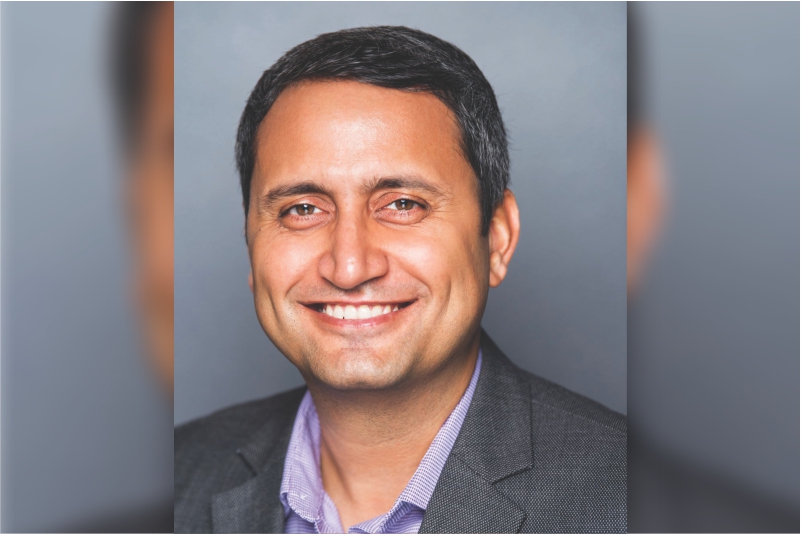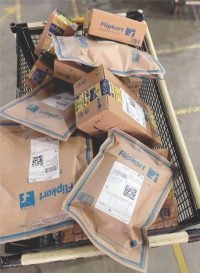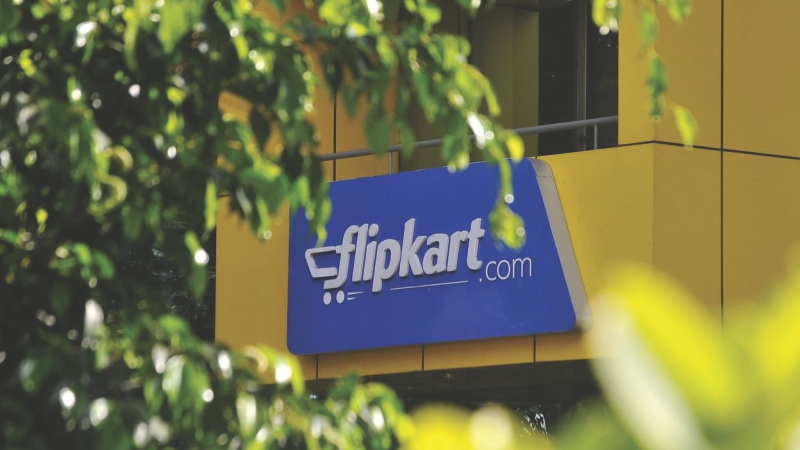E-commerce major Flipkart has cut down the use of plastic packaging in its own supply chain to about a half. It has also started phasing out plastic packaging by using paper-based packaging.

In an exclusive interview given to Paper Mart, Mr. Mahesh Pratap Singh, Head Sustainability and Social Responsibility, Flipkart, talks about the importance of sustainability and the company’s commitment to using sustainable packaging materials and efforts to fully eliminate single-use-plastic consumption in its supply chain by March 2021.
Here are a few excerpts from this interesting interview.
Paper Mart: Flipkart has announced that it has reduced the use of plastic packaging in its own supply chain network by 50 percent as it moves towards the larger goal of zero wastage. What are the factors behind this achievement?
Mahesh Pratap Singh: As committed corporate citizens, we at Flipkart understand our responsibility and have adopted a very proactive approach to environmental sustainability. We are committed to using sustainable packaging materials in our supply chain and have undertaken several initiatives to accelerate our efforts to fully eliminate single-use-plastic consumption in our supply chain by March 2021. We have taken several major steps to replace single-use plastic in our supply chain with eco-friendly alternatives. Some of these initiatives include replacing plastic security bags with security envelopes made of paper, introduction of eco-friendly paper shreds, replacing poly pouches with recycled paper bags, replacing bubble wraps and airbags with carton waste shredded material and 2 Ply roll. In addition, all fillers and wrapping films have been replaced with cushioning materials made from recycled paper. We have also actively engaged with regulators (CPCB) and have an authorized EPR plan in place, which means that we will collect back plastic equivalent to our consumption, adding no incremental plastic to the planet.
We are committed to using sustainable packaging materials in our supply chain and have undertaken several initiatives to accelerate our efforts to fully eliminate single-use-plastic consumption in our supply chain by March 2021.
There is a good mix of technology at our fulfillment centers which helps us to optimize the type and volume of packaging to prevent wastage. We have undertaken “no package shipping” for many products. We are also working actively with various partners on our long-term sustainability initiatives and to drive awareness within the ecosystem.

PM: From what I can gather, Flipkart has been driving several long-term initiatives as it pursues sustainable growth. Could you tell us a little bit about these initiatives?
MPS: At Flipkart, we take a very holistic view of sustainability, including both social and environmental considerations. Within the environmental sphere, our long-term sustainability efforts include several initiatives across our value chain including resource efficiency, renewable and natural resources, sustainable packaging, green infrastructure, and the introduction of electric vehicles (EVs) in our last-mile delivery network. It is our aim to effect sustainable change by taking the entire ecosystem that works with us, and we are actively engaged with our stakeholders to achieve those goals.
Talking more specifically about some of the initiatives alluded to above, our vision on mobility is to replace a significant portion of our last-mile delivery vehicles with EVs in the coming years and to contribute to sustainable mobility solutions. We are working closely with various manufacturers, in this regard, on designs that are suitable for e-commerce deliveries. We believe that these steps will contribute meaningfully towards paving the way for larger adoption of EVs in the country and supplement India’s larger sustainability goal.
We are also embedding resource efficiency and renewables in our build-outs. Some of our large warehouse projects are being built with ambitious sustainability targets, and we are pursuing the highest standards as prescribed by the Green Building Council of India. Similarly, our datacenter at Hyderabad runs largely on renewable energy. We recently certified our strategic supply chain facilities for ISO 14001 (Environmental management system), a crucial benchmark for our preparedness to prevent environmental pollution, and emerged as the first e-commerce company in India to get the highest number of facilities ISO certified. It may be mentioned that ISO 14001 specifies the requirements for an environmental management system that an organization can use to enhance its environmental performance and manage its environmental responsibilities in a systematic manner that contributes to the environmental pillar of sustainability.
We have taken several major steps to replace single-use plastic in our supply chain with eco-friendly alternatives. Some of these initiatives include replacing plastic security bags with security envelopes made of paper, introduction of eco-friendly paper shreds, replacing poly pouches with recycled paper bags.
We have already reduced use of plastic packaging by 50 percent in our own supply chain and are working on fully eliminating it. Furthermore, we are working with policymakers, state governments, and other stakeholders to understand how we can enable a feasible transition for lakhs of our seller partners from plastic packaging to sustainable alternatives that are affordable, scalable, and easily available.
As an organization, we are conscious of our role in bringing sustainability to our operations. At our campus in Bengaluru, we’re proud to have a role model workplace which has eliminated plastic and single-use-materials in our cafeterias, the use of plastic bottles, stirrers and cutlery; and we have a thorough waste-segregation regime.
To a large extent, the vision of sustainability hinges on a conducive infrastructure. Our headquarter scores well when it comes to contributing to sustainability. From having large glass walls, allowing natural night to come in thereby reducing power consumption, we ensure that we use less water and less resources, complemented by micro innovations, which are affecting our daily lives positively.

Going forward, we aim to bring sustainability to the foreground by engaging the entire value chain in all our initiatives. Recently, on World Environment Day (5th June 2020), we organized our first ever virtual Sustainability Action Summit and invited several sustainability leaders from the ecosystem to engage with Flipkart leaders on topics including sustainable communities, climate change, etc. Leading up to the event, we also organized several workshops and webinars to involve our employees in the sustainability conversation, to motivate them to adopt sustainable practices in their lives, and to become ambassadors of the change we aim to bring about.
PM: What are the sources of the paper you use for packaging? Is it from sustainable sources?
MPS: Yes, sustainable sourcing is a key consideration for us.
PM: What is your approach to environmental sustainability and social responsibility?
MPS: We are taking a holistic approach to sustainability and ensuring we positively impact our entire value chain and the communities they represent – they could be sellers, consumers or our employees. We believe that sustainability must be practiced across social, economic and environmental parameters. We are hoping to drive a responsible value chain and use our strength in innovation and industry leadership to create a force for good. Several of our sustainability efforts are aligned to the United Nations’ Sustainable Development Goals. We believe that sustainability is a common goal and that it is important to develop a culture that encourages community participation and enables action towards achieving it. Besides the initiatives mentioned earlier, including introduction of electric vehicles, green buildings, etc., some of the other Initiatives I can point out are:
Seller empowerment: Flipkart Samarth, launched on July 31, 2019 in New Delhi with 5 NGO partners, is a program envisaged to uplift the underserved sections of society that have traditionally been left out of the expansion of modern retail. This initiative is envisaged to drive national market access for these underserved communities to a growing PAN-India registered customer base of over 200 million, while empowering them to leverage the benefits of the e-commerce model. Additionally, Samarth supports their e-commerce journey from on-boarding until they reach familiarity with online selling. This program has received phenomenal market response, and we have several NGOs and government bodies in the on-boarding pipeline. Similarly, we do a lot of work to educate and empower MSMEs across India with respect to e-commerce.
Fostering inclusion: Empowerment and inclusion are the key tenets of Flipkart’s social responsibility agenda. They are well integrated across several of our business and social responsibility initiatives. In particular, we are proud of the work we are doing with persons with disability (PwDs) where we not only provide them with employment opportunities but also offer them a support system through inclusive workplace policies. At present, Flipkart has over 500 differently abled employees as part of this programme across the supply chain, including sorters, pickers, packers, and delivery executives. Similarly, we have a specific focus category around differently-abled and rural women in Project Samarth to empower them with national market access and sustained income generation.
Culture of giving: Fostering a culture of giving across the ecosystem for social causes, calamity and disaster relief and bridging the gap between the haves and the have-nots is another focus area of our social efforts. We are leveraging our scale and reach across over 200 million Flipkart consumers, lakhs of sellers, and employees to find unique ways to contribute to social causes. Once such an initiative was our participation in Daan Utsav where for the first time we ran a one-of-a-kind 360-degree campaign supporting a variety of social causes while democratizing giving for our stakeholders. We are also leveraging our global sourcing and supply chain to source and donate scarce PPE supplies to aid India’s efforts to fight COVID-19 pandemic and empower our frontline healthcare workers.
PM: What other packaging concepts are you planning to introduce?
MPS: As mentioned earlier, we continue to look for sustainable packaging alternatives and are working with various ecosystem partners to develop scalable solutions suitable for e-commerce. We believe that the collective efforts by all stakeholders will enable us to implement effective initiatives to eliminate the consumption of single-use plastic and bring in a lot of positive value for the ecosystem.
Our journey does not end there though; we are constantly exploring new methods and materials to become more sustainable in the way we reduce secondary packaging for our consumers.
We continue to look at all the elements of packaging and value chain and undertake “no package shipping” for many products.
PM: Could you tell us a little bit about the sustainable packaging for Flipkart’s supply chain assets in Maharashtra? Is it different from the company’s packaging in other states?
MPS: We have started phasing out plastic packaging from our supply chain in Maharashtra through the use of paper-based packaging from May 1, 2020. This includes replacing plastic security bags with security envelopes made of paper. We have ensured that the paper packaging is sturdy and enables the secure movement of packages. Additionally, all fillers and wrapping films have been replaced with cushioning materials made from recycled paper. As mentioned earlier, our vision is to eliminate the use of single-use plastic packaging from our supply chain by March 2021, and our recent packaging initiatives in Maharashtra will serve as a learning for us to implement sustainable packaging in other states as well.
PM: One of Flipkart’s broader environmental sustainability efforts is the introduction of electric vehicles in its last-mile delivery network. Now, electric vehicles are rather costly in India. So, how cost-effective is the whole idea of introducing electric vehicles?
MPS: The introduction of EVs in our supply chain is one of the major steps towards ensuring clean and sustainable mobility. It is an integral part of our larger sustainability vision, which guides our efforts in building technologies for solving crucial environment and civic issues. We see tremendous potential for electric freight mobility to build a green and robust supply chain for the future. Our efforts will help us contribute to electric mobility while also reducing our dependence on conventional power sources and bringing cost efficiencies to the business. We are working with the entire ecosystem of partners to also ensure that the switch can be a long-term solution.
PM: Which is more cost-effective – paper packaging or plastic packaging? Do you think cost is the main factor hindering the growth of fiber-based packaging?
MPS: Besides cost, accessibility, scalability and durability are three other aspects that need to be addressed to popularize paper or other fiber-based packaging. The onus lies on the ecosystem to collaborate to facilitate a smooth transition from plastic packaging to sustainable packaging. We are working with various stakeholders and ecosystem partners to identify solutions that can catalyze wider adoption of sustainable packaging among lakhs of Flipkart’s sellers.
PM: The Walmart-owned company has also started phasing out plastic packaging through use of paper-based packaging. As you may have noticed, the use of paper for packaging purposes is growing every year, due to its excellent environmental performance and the increasing demand related to e-commerce and delivery services. Do you think that in times to come fiber-based packaging will completely replace plastic packaging?
MPS: We are all aware of the need for renewable resources and reducing the generation of waste. Pulp-based packaging is an alternative that we have been able to scale so far. Our journey does not end there though; we are constantly exploring new methods and materials to become more sustainable in the way we reduce secondary packaging for our consumers. In the e-commerce industry, ecosystem collaboration continues to play a major role in developing innovative sustainable alternatives to plastic packaging. Currently, efforts are also being made to eliminate the use of virgin plastic and move towards the use of recycled plastic in packaging. We will continue to explore scalable solutions to introduce sustainable packaging and work towards implementing them across our supply chain.
PM: Do you think that the ongoing COVID-19 pandemic has reinforced the links between health, environment and the economy?
MPS: The COVID-19 pandemic has made us aware of the interconnected nature of the world we live in. It has exposed the dangers of a linear take-make-waste business model and underlined the importance of a circular economy that aims to eliminate waste through the continual use of resources. It has also highlighted the need for adopting a holistic approach to sustainable growth through measures such as reduction of single-use plastic, rethinking our approach to food waste, fostering environmental awareness, and empowerment of vulnerable communities. It has emphasized the need for businesses to engage meaningfully with communities to foster resilience and to view sustainability as a common goal in the journey towards long-term sustainable growth.



